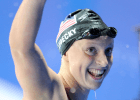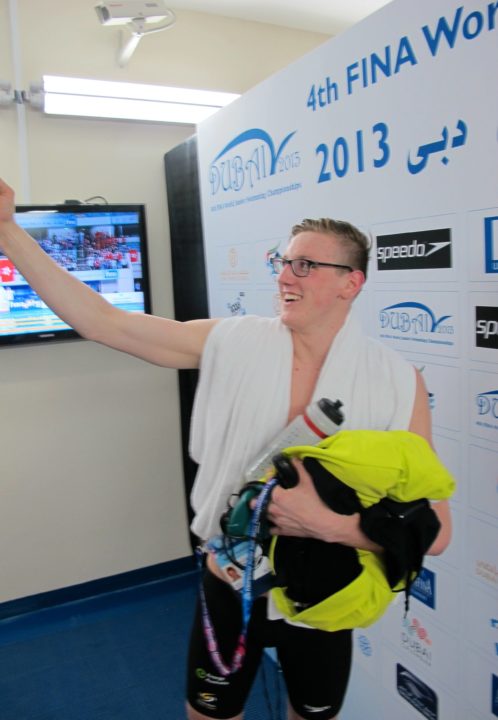
The Australians finalized their 2014 Commonwealth Games team on Sunday evening in Brisbane, and perhaps nowhere was there more excitement than in the men’s 1500 free – the last men’s qualification event of this tough 6-day meet.
Men’s 1500 Free – FINALS
Though last year’s distance darling Jordan Harrison wasn’t on his top form, going 15:03.24 for second (12 seconds slower than he was last year), the new young distance darling Mack Horton came through big with a inning time of 14:51.55 in the men’s 1500 free. That both breaks the Junior World Record and ranks him as the 4th-fastest Australian of all-time in the event (behind Hackett, Perkins, and Harrison).
Ultimately, with the Commonwealth Games teams announced and the picture cleared-up late Sunday Brisbane time, and Harrison’s “B” standard had no problem earning an invite to Glasgow.
The same went for 20-year old Matthew Levings, who finished 3rd in 15:09.67, meaning that Australia will send three 1500 swimmers who are aged 17, 18, and 20 to the Commonwealth Games. Australian men’s distance swimming is really and finally starting to get exciting again.
Women’s 400 Free – FINALS
In the women’s 400 free, Bronte Barratt took an early run at the Australian Record, and though her closing 100 wasn’t great, she still came away with a winning time of 4:04.56. That easily cleared the Australian “A” standard in the event. She sits behind only American Katie Ledecky (and only by a tenth) globally this year, though with championship season in Europe coming up fast there will be a lot of challenges to that sitting.
2014 LCM Women 400 Free TYR World Ranking
LEDECKY
3.58.37*WR
| 2 | Jazmin CARLIN | GBR | 4.03.24 | 08/24 |
| 3 | Sharon VAN ROUWENDAAL | NED | 4.03.76 | 08/24 |
| 4 | Mireia BELMONTE GARCIA | ESP | 4.03.84 | 04/13 |
| 5 | Federica PELLEGRINI | ITA | 4.04.42 | 08/24 |
Also booking swims for Scotland were 17-year old Remy Fairweather, who’s been nearly silent at the meet until this point, with a 4:06.02, and 20-year old Jessica Ashwood in 4:07.30.
Veteran Kylie Palmer took 4th in 4:07.53, which means she’s missed the teams for this summer; Leah Neale was 5th in 4:08.95; and Katie Goldman finished a disappointing 6th in just 4:11.92 and will also miss this summer’s teams.
Men’s 50 Free – FINALS
Nobody was as fast in the men’s 50 free final as Eamon Sullivan’s 21.65 in the semi’s, however Sullivan’s add in the last round of this race didn’t cost him a crucial spot for this summer. He swam a 21.90 to win the race, placing him just ahead of 100 winner Cameron McEvoy and his 21.97.
Behind those two, there was a tie for 3rd that mandated a swimoff to see who would earn the bid at the Commonwealth Games. James Magnussen, who in 2013 really found his sprinting stride, was the defending champion coming into this meet. Matthew Abood at 27 is a veteran and has a lot more years of that pure-sprint experience behind him, having won the national title in 2009 and 2011.
The pair tied in 22.02 for 3rd-place, which per Australian qualifying standards necessitated a swimoff to get the spot.
In that swimoff, it wasn’t the veteran who came through, though; rather it was Magnussen who found his speed for his best swim of the meet in 21.77, with Abood 2nd in 21.88. Magnussen has the better top-end potential of the two, so this is probably the outcome that Australian brass wanted to see from the race if they were allowed to be so impartial.
5th place went to the younger brother Andrew Abood in 22.26, and after that the times tailed off a bit. Te Haume Maxwell, former age group star, was 6th in 2265, University of Tennessee (U.S.) freshman sprint star Luke Percy was 7th in 22.71, and the youngest finalist Cameron Jones was 8th in 23.11.
Women’s 50 Back – FINALS (non-qualifying event)
With little pressure on of a qualification, Emily Seebohm cruised to a win in the women’s 50 backstroke in 27.95 – a couple of tenths faster than the mark with which she won last year.
St. Peter’s Western swimmers Meagen Nay (28.66) and Madison Wilson (28.67) were behind her in 2nd and 3rd place respectively, followed by Belinda Hocking in 4th (28.94).
The future of Australian backstroking, perhaps, Minna Atherton took 5th in 29.20 at just 13 years old. Watch for a good swim from her next week at the Age Championships.
Men’s 200 IM – FINALS
Daniel Tranter has been strong all week, swimming very well in both the 200 breast and the 200 fly.
Those races, hwoever, weren’t his focus events for the week, and they were all a build-up to the men’s 200 IM final on Sunday.
There, he matched up with two other swimmers having a good week, Thomas Fraser-Holmes and Mitch Larkin; plus another IM specialist time from whom we hadn’t heard much in Brisbane, Justin James.
The top 6 in this race (the 5 above, plus Travis Mahoney and Kenneth To) were all about even through the backstroke leg, with Tranter actually sitting 6th (his long-axis strokes are his weakness).
But as so often happens, breaststroke was the separator here, and Tranter pulled from 6th to 1st with a very good 33.27 split. At that point, Mahoney fell off the pace, leaving a battle of five for the Commonwealth Games spots.
Next to go was To, who just never got into a rhythm in his freestyle coming off of his typically-catapulting underwaters. He actually fell all the way back to 6th in 2:00.49, behind Mahoney’s 2:00.22 for 5th.
Fraser-Holmes had a great freestyle leg, but ultimately Tranter’s lead was too big, and he would win in 1:57.66. Fraser-Holmes took 2nd in 1:57.88, and Mitch Larkin was 3rd in 1:59.29.
That meant James would place 4th in 1:59.98.
Women’s 1500 Free – TIMED FINALS (non-qualifying)
By the time the women’s 1500 free came around, the last non-para event of the meet, it was pretty well determined who would make the team, so ultimately there was a lot of cruising going on it seemed. Winner Laura Crockart, who looked good en route to earning her Commonwealth Games spot in the 800 free, won this race in 16:17.36, beating out defending champion and 15-year old Chelsea Gubecka (16:23.41).
20-year old Kareena Leah (16:24.81) rounded out the medal-winners in the event.
Para-Finals
- The big score of the para-finals came from 18-year old Mitchell Kilduff, who cleared the World Record in the S14 men’s 100 fly with a 59.72.
Team Selections
Team selections are finalized, and so we will report in separate posts and link to them here when complete.

Very good swim by Horton. Anybody knows what’s Ryan Cochrane best time in the 400 m freestyle? I was very surprised that neither Jarrod Poort nor Ryan Napoleon were in the final. What happened to them?
Cochrane’s best 400 is 3:44.85 from the Beijing Olympics, he’s gone a 3:45.02 textile last summer. He just won trials in a 3:47.30, not that he had anyone to race though and tends to always preform better in the summer anyways.
For reference he won the trials 1500 in 15:01.72 again without much competition. His best is 14:39.63 from the London Olympics.
Men’s 1500 free final
http://www.youtube.com/watch?v=mLfW55miXxQ
Men’s 200 IM final
http://www.youtube.com/watch?v=k45HUjsQGxI
Women’s 50 back final
http://www.youtube.com/watch?v=AfUAK_de9zM
Men’s 50 free final
http://www.youtube.com/watch?v=mZp-4FUmMXM
Bobo I think there was a swim-off in the 50 free between Magnussen and Abood where they went faster than in this final, is the video available somewhere?
Women’s 400 free final
http://www.youtube.com/watch?v=MZ_nx7msNNE
Woulf horton be able by rio to beat cochrane for silver? He would probably need to swim 13 to 15 seconds faster
If he’s healthy and no catastrophe or accident, I am sure Horton will be ready in Rio.
He will be 19 or 20, which is the peak age for 1500 male swimmers. Remember, Hackett cut down his time by more than 10 seconds in just one year 2000 to 2001. It is normal for distance guys to make huge drop and then stay stagnant or slower.
In 1991 worlds , Perkins went 14:50.58, and a year later he went 14:43 in Barcelona. He was at the same age as Horton now.
In 2000 Sydney, Hackett went 14:48 and a year later in Fukuoka he went 14:34.
Obviously I am not comparing Horton’s talent with those two legends, but it would not surprise me if he goes 14:45 or lower next year in Kazan. He may even already go 14:45 this summer at the Commonwealth or pan pacs.
Why not?
Ha!that explains Magnussen fatigue in 100free…. he made only 21.77 in 50free, and opened in 22.76 his 100free….in another words:he wasnt ready to open at that speed(less than a second of his 50) and make his traditional coming home…the cost is always big.
He needs to decide if he is a speed guy that swims 100, or if he is a 200free guy swimming 100free.A 200free guy never reaches his 50free potential, and the difference is sometimes minimal(like swimming 50 in 22s and opening 100free in 22.7 like Mcevoy does-Gustavo Borges was the same).
A top speed guy open near(give or take)1.2s(or higher to conserve the energy), because when you open crazy fast, you die crazy fast.I remember… Read more »
Vlad actually had a decent time for opening that fast
For your information, Vlad Morozov has swum in a little meet in California 2 weeks ago.
22.49 in the 50 free
49.42 in the 100 free
http://www.socalswim.org/live-results/2014MVNMarchSr
But Magnussen was even faster on the first leg of his 47.10 swim in 2012 … I think he simply messed with his turn. Plus, Mc Evoy had a real good first 50. Yes, Magnussen’s main strength is the 2nd leg, but a natural 200 freestyler like McEvoy will always be hard to beat in the 2nd leg, no matter what.